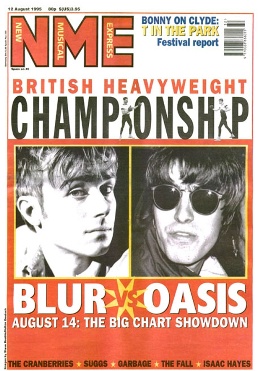Britpop
Britpop is a music genre and cultural movement that emerged in the United Kingdom in the early 1990s. It is characterized by its emphasis on Britishness, and it produced a series of bands that drew heavily on the British guitar music of the 1960s and 1970s. The movement was partly a reaction against the dominance of American grunge music and the UK's own shoegaze scene.
Origins and Influences[edit | edit source]
Britpop was influenced by a variety of British music styles, including the British Invasion bands of the 1960s, such as The Beatles, The Kinks, and The Rolling Stones, as well as the glam rock of the 1970s and the indie rock of the 1980s. The genre is often seen as a reaction to the Americanization of popular music, with bands seeking to create a distinctly British sound and identity.
Key Bands and Albums[edit | edit source]
Some of the most prominent bands associated with Britpop include Oasis, Blur, Pulp, Suede, and Elastica. These bands achieved significant commercial success and critical acclaim during the 1990s.
- Oasis - Known for their anthemic sound and the rivalry with Blur, Oasis released several successful albums, including Definitely Maybe (1994) and (What's the Story) Morning Glory? (1995).
- Blur - Blur's music evolved from the jangly pop of their early work to a more eclectic sound. Their albums Parklife (1994) and The Great Escape (1995) are considered Britpop classics.
- Pulp - Pulp's breakthrough album Different Class (1995) included the hit single "Common People", which became an anthem of the Britpop era.
- Suede - Suede's self-titled debut album Suede (1993) is often credited with kickstarting the Britpop movement.
- Elastica - Elastica's debut album Elastica (1995) was notable for its punk-influenced sound and achieved significant success.
Cultural Impact[edit | edit source]
Britpop was not just a musical movement but also a cultural phenomenon. It was associated with the rise of Cool Britannia, a period of increased pride in British culture during the mid-1990s. The movement was closely linked with other aspects of British culture, including fashion, art, and politics. The New Labour government under Tony Blair embraced the Britpop movement, and many Britpop musicians were vocal in their support of Blair's policies.
Decline and Legacy[edit | edit source]
By the late 1990s, the popularity of Britpop began to wane. The movement's decline was marked by the release of Oasis's Be Here Now (1997), which, despite initial success, was seen as overblown and marked the end of the Britpop era. However, the influence of Britpop can still be seen in contemporary British music, and many of the bands from the era continue to enjoy a dedicated fanbase.
Related Pages[edit | edit source]
Categories[edit | edit source]
Search WikiMD
Ad.Tired of being Overweight? Try W8MD's NYC physician weight loss.
Semaglutide (Ozempic / Wegovy and Tirzepatide (Mounjaro / Zepbound) available. Call 718 946 5500.
Advertise on WikiMD
|
WikiMD's Wellness Encyclopedia |
| Let Food Be Thy Medicine Medicine Thy Food - Hippocrates |
Translate this page: - East Asian
中文,
日本,
한국어,
South Asian
हिन्दी,
தமிழ்,
తెలుగు,
Urdu,
ಕನ್ನಡ,
Southeast Asian
Indonesian,
Vietnamese,
Thai,
မြန်မာဘာသာ,
বাংলা
European
español,
Deutsch,
français,
Greek,
português do Brasil,
polski,
română,
русский,
Nederlands,
norsk,
svenska,
suomi,
Italian
Middle Eastern & African
عربى,
Turkish,
Persian,
Hebrew,
Afrikaans,
isiZulu,
Kiswahili,
Other
Bulgarian,
Hungarian,
Czech,
Swedish,
മലയാളം,
मराठी,
ਪੰਜਾਬੀ,
ગુજરાતી,
Portuguese,
Ukrainian
Medical Disclaimer: WikiMD is not a substitute for professional medical advice. The information on WikiMD is provided as an information resource only, may be incorrect, outdated or misleading, and is not to be used or relied on for any diagnostic or treatment purposes. Please consult your health care provider before making any healthcare decisions or for guidance about a specific medical condition. WikiMD expressly disclaims responsibility, and shall have no liability, for any damages, loss, injury, or liability whatsoever suffered as a result of your reliance on the information contained in this site. By visiting this site you agree to the foregoing terms and conditions, which may from time to time be changed or supplemented by WikiMD. If you do not agree to the foregoing terms and conditions, you should not enter or use this site. See full disclaimer.
Credits:Most images are courtesy of Wikimedia commons, and templates, categories Wikipedia, licensed under CC BY SA or similar.
Contributors: Prab R. Tumpati, MD







